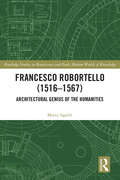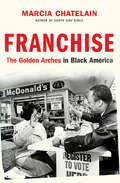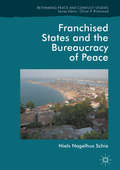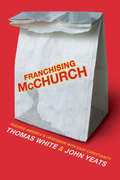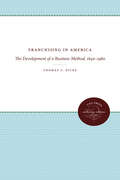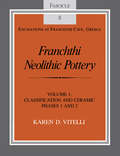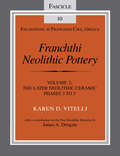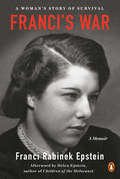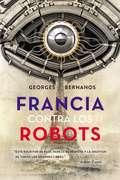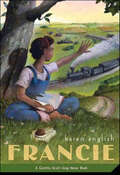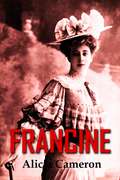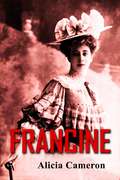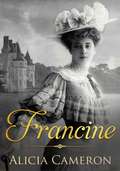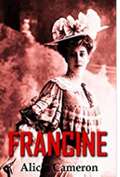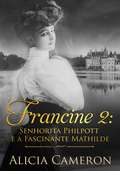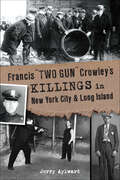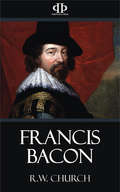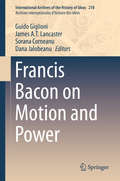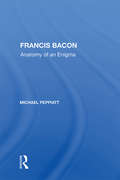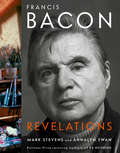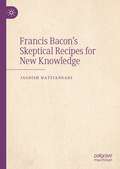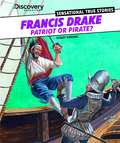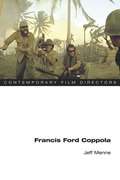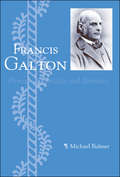- Table View
- List View
Francesco Robortello: Architectural Genius of the Humanities (Routledge Studies in Renaissance and Early Modern Worlds of Knowledge)
by Marco SgarbiThis book explores the intellectual world of Francesco Robortello, one of the most prominent scholars of the Italian Renaissance. From poetics to rhetoric, philology to history, topics to ethics, Robortello revolutionised the field of humanities through innovative interpretations of ancient texts and with a genius that was architectural in scope. He was highly esteemed by his contemporaries for his acute wit, but also envied and disparaged for his many qualities. In comparison with other humanists of his time such as Carlo Sigonio and Pier Vettori, Robortello had a deeply philosophical vein, one that made him unique not only to Italy, but to Europe more generally. Robortello’s role in reforming the humanities makes him a constituent part of the long-fifteenth century. Robortello’s thought, however, unlike that of other fifteenth-century humanists, sprung from and was thoroughly imbued with a systematic, Aristotelian spirit without which his philosophy would never have emerged from the tumultuous years of the mid-Cinquecento. Francesco Robortello created a system for the humanities which was unique for his century: a perfect union of humanism and philosophy. This book represents the first fully fledged monograph on this adventurous intellectual life.
Franchise: The Golden Arches In Black America
by Marcia ChatelainFrom civil rights to Ferguson, Franchise reveals the untold history of how fast food became one of the greatest generators of black wealth in America. Often blamed for the rising rates of obesity and diabetes among black Americans, fast food restaurants like McDonald’s have long symbolized capitalism’s villainous effects on our nation’s most vulnerable communities. But how did fast food restaurants so thoroughly saturate black neighborhoods in the first place? In Franchise, acclaimed historian Marcia Chatelain uncovers a surprising history of cooperation among fast food companies, black capitalists, and civil rights leaders, who—in the troubled years after King’s assassination—believed they found an economic answer to the problem of racial inequality. With the discourse of social welfare all but evaporated, federal programs under presidents Johnson and Nixon promoted a new vision for racial justice: that the franchising of fast food restaurants, by black citizens in their own neighborhoods, could finally improve the quality of black life. Synthesizing years of research, Franchise tells a troubling success story of an industry that blossomed the very moment a freedom movement began to whither.
Franchised States and the Bureaucracy of Peace (Rethinking Peace and Conflict Studies)
by Niels Nagelhus SchiaThis book examines a new type of state formation evoked by the rise of transnational rule, what Schia calls franchised states. Drawing on anthropological studying-through fieldwork within the UN organization, he demonstrates how peacebuilding activities turned Liberia into an object of governing, whereby the UN, in seeking to build the state, also became the state. The sovereign state of Liberia here emerges as a franchise rather than a self-contained entity. Two implications follow: First, that international peacebuilding turns post-conflict countries into clients of the international community. Second, that "sovereignty" is no longer exclusively associated with the state: it is organized in and through specific practices of governing where a state actor is only one among a range of actors. With these findings, the book moves beyond previous work on peacebuilding by focusing on the unbundling of sovereignty. It contributes to the literature on the changing forms of sovereignty by showing the specific ways in which sovereignty is organized, packaged and enacted, often by actors working under international auspices. This book will be of interest to practitioners and students interested in international organizations, international relations, the study of international practices, UN, and peacebuilding.
Franchising McChurch
by Thomas White Jon Mark YeatsWe live in a fast-food nation, where the service is efficient, the products are peer-tested, and size is king. And this consumer-driven approach is seeping into the church. Across the country, churches are creating entertaining, pop culture-savvy services that feel more market-driven than ministry. On the menu? A proven blend of dynamic music, high-tech dazzle, and topical teachings. And just like any successful product, churches are launching campuses that build on their brand. But is the franchised church of today leading to the disenfranchised believers of tomorrow? Though thousands flock to these services, how many lives are truly being changed? Have we traded real truth for relevancy? Franchising McChurch takes an honest look at the rise of consumer-minded ministries. Authors Thomas White and John Yeats tackle a spiritual shift that is raising provocative issues such as: The blurry line between entertainment and evangelism A marketing approach to ministry The warped yardstick for measuring church success Feel-good messages that avoid tough truths Candid and compelling, Franchising McChurch calls us back to the heart of Christ's church, and shares the Biblical design for delivering meaningful, life-changing ministry in a fast-food world.
Franchising in America: The Development of a Business Method, 1840-1980
by Thomas S. DickeUsing a series of case studies from five industries, Dicke analyzes franchising, a marketing system that combines large and small firms into a single administrative unit, strengthening both in the process. He studies the franchise industry from the 1840s to the 1980s, closely examining the rights and obligations of both the parent company and the franchise owner.Originally published in 1992. A UNC Press Enduring Edition -- UNC Press Enduring Editions use the latest in digital technology to make available again books from our distinguished backlist that were previously out of print. These editions are published unaltered from the original, and are presented in affordable paperback formats, bringing readers both historical and cultural value.
Franchthi Neolithic Pottery, Volume 1: Classification and Ceramic Phases 1 and 2 (Excavations at Franchthi Cave, Greece #8)
by Karen D. VitelliThe first of two systematic reports on the more than one million sherds of pottery recovered from the Franchthi Cave in Greece.Over two and a quarter metric tons of pottery were recovered from Neolithic deposits at Franchthi and Paralia which will significantly increase our understanding of Neolithic pottery and Neolithic society in southern Greece. Through the development and application of a new system of ceramic classification, this fascile analyzes the pottery from the earlier Neolithic deposits as a direct reflection of the human behavior that produced it.“A highly innovative study that foregrounds the decision-making and technological choices of Neolithic potters.” —Antiquity“Imaginative, rigorous and admirably lucid study.” —Journal of Hellenic Studies
Franchthi Neolithic Pottery, Volume 2: The Later Neolithic Ceramic Phases 3 to 5 (Excavations at Franchthi Cave, Greece #10)
by Karen D. VitelliThe second of two systematic reports on the more than one million sherds of pottery recovered from the Franchthi Cave in Greece.Over two and a quarter metric tons of pottery were recovered from Neolithic deposits at Franchthi and Paralia which will significantly increase our understanding of Neolithic pottery and Neolithic society in southern Greece. Through the development and application of a new system of ceramic classification, this fascile analyzes the pottery from the earlier Neolithic deposits as a direct reflection of the human behavior that produced it.“A highly innovative study that foregrounds the decision-making and technological choices of Neolithic potters.” —Antiquity“Imaginative, rigorous and admirably lucid study.” —Journal of Hellenic Studies
Franci's War: A Woman's Story of Survival
by Franci Rabinek EpsteinThe engrossing memoir of a spirited and glamorous young fashion designer who survived World War ll, with an afterword by her daughter, Helen Epstein.In the summer of 1942, twenty-two year-old Franci Rabinek--designated a Jew by the Nazi racial laws--arrived at Terezin, a concentration camp and ghetto forty miles north of her home in Prague. It would be the beginning of her three-year journey from Terezin to the Czech family camp in Auschwitz-Birkenau, to the slave labor camps in Hamburg, and Bergen Belsen. After liberation by the British in April 1945, she finally returned to Prague.Franci was known in her group as the Prague dress designer who lied to Dr. Mengele at an Auschwitz selection, saying she was an electrician, an occupation that both endangered and saved her life. In this memoir, she offers her intense, candid, and sometimes funny account of those dark years, with the women prisoners in her tight-knit circle of friends.Franci's War is the powerful testimony of one incredibly strong young woman who endured the horrors of the Holocaust and survived.
Francia contra los robots
by Georges BernanosEn 1948, el reconocido escritor de inspiración mística Georges Bernanos desapareció, dejando el manuscrito de un último libro, publicado póstumamente: Francia contra robots. Esta apasionada defensa de la libertad es un desafío a las idolatrías paganas de ganancia y fuerza, con una increíble actualidad. Esta diatriba contra la "sociedad de las máquinas" es un grito futurista, para señalar una sociedad en la que es posible llevar una vida digna de seres humanos.Esta visionaria obra señala una Sociedad futura donde la tecnología domina a los seres humanos y los deshumaniza. Atacando la conformidad burguesa en nombre de sus creencias católicas, el autor afirma "que no es ni de izquierda ni derecha" y los conflictos internos son especialmente la fuente de las maldades que disminuyen al hombre y todas las tiranías que lo aplastan.“El peligro no está en las máquinas, de lo contrario deberíamos hacer este sueño absurdo de destruirlas por la fuerza, a la manicura de los iconoclastas que, rompiendo las imágenes, se halagaron aniquilando también las creencias. El peligro no está en la multiplicación de máquinas, sino también en el número cada vez mayor de hombres, que desde su infancia, solo desean lo que las máquinas pueden proveer”.
Francie
by Karen EnglishA distinctive new voice in children's fictionFrancie lives with her mother and younger brother, Prez, in rural Alabama, where all three work and wait. Francie's father is trying to get settled in Chicago so he can move his family up North.Unfortunately, he's made promises he hasn't kept, and Francie painfully learns that her dreams of starting junior high school in an integrated urban classroom will go unfulfilled. Amid the day-to-day grind of working odd jobs for wealthy white folks on the other side of town, Francie becomes involved in helping a framed young black man to escape arrest -- a brave gesture, but one that puts the entire black community in danger. In this vivid portrait of a girl in the pre--Civil Rights era South, first-time novelist Karen English completes Francie's world using lively vernacular and a wide array of flesh-and-blood characters.Francie is a 2000 Coretta Scott King Author Honor Book.
Francine
by Alicia Cameron Carmen SantarpinoNella Londra edoardiana, la dama di una lady è scacciata nel freddo. Ma Francine non conosce la parola disperazione e quindi incontreremo una giovane donna notevole esempio di resilienza. NOTA: Francine è una breve storia per kindle.
Francine
by Alicia Cameron Marisa PavanEn la época Eduardiana, en Londres, la criada de una dama es despedida una noche fría. Pero la desesperación no caracteriza a Francine y conocemos a una joven con un poder de resistencia notable. Francine puede ser la criada de una dama pero es perfectamente capaz de cuidarse a sí misma, incluso cuando la despiden. En realidad, descubrimos que Francine está interesada en el bienestar de muchas mujeres y es cruel en su propósito por ayudarlas.
Francine
by Alicia Cameron Heloisa BirsenekNa Londres eduardiana, a camareira de uma dama é posta para fora no frio. Mas desespero não faz parte dos planos de Francine e conhecemos uma jovem de resiliência notável. Observação: Francine é um conto para kindle. Comentários dos leitores: “Este é um adorável conto(...) [Francine] é leve, encantador e divertido.” “Uma nova personagem divertida com quem Alicia Cameron pode nos deliciar” “Personagem fantástica!” “Este é um conto fantástico! A autora consegue escrever de modo a passar uma ideia clara de como a vida deve ter sido para moças como Francine. É único no sentido de que a heroína não é uma dama da alta sociedade, mas uma empregada bastante empreendedora. (...) Eu REALMENTE quero ler mais do trabalho dessa autora!” “Amo as histórias e os livros de Alicia Cameron” “Francine é uma personagem inesquecível” “Eu queria que a história nunca terminasse!” “Uma mulher que transforma a si mesma e todas as mulheres que encontra” "Uma história de quebrar e aquecer o coração. Uma luta dos oprimidos pelos seus pares, não devendo nada a clássicos como ‘Capitães da Areia’”
Francine
by C. Dussault Gerry CameronLondres, à l’époque edwardienne. Une jeune dame de compagnie est rejetée dans le froid. Toutefois, Francine n’est pas celle qui reste à geindre, non; venez rencontrer une femme d’une résilience simplement admirable. ATTENTION : Francine est une nouvelle.
Francine 2 - Srta. Philpott e a Fascinante Mathilde
by Alicia Cameron Heloisa BirsenekQuando a governanta desempregada, Srta. Philpott, encontra Francine novamente, ela não pode imaginar como sua vida será transformada. Na nova Era Eduardiana (a era de Downtown Abbey), há muitas mudanças para as mulheres. Mas Srta. Philpott agora tem quarenta anos e acha que todas as inovações do novo século têm pouco a ver com ela. Nem faz ideia do quanto está errada. Com a ajuda de Francine, ela está prestes a se tornar uma mulher moderna e a descobrir que tem talentos com os quais jamais sonhou. Suas habilidade só são limitadas por sua imaginação, e como uma leitora ávida, a imaginação de Srta. Philpott é pródiga. Esta novella leve continua (a pedido dos leitores) as aventuras de Francine, a empregada descartada do conto original, cujo efeito na vida de todos ao seu redor é alegremente empoderador. Srta. Philpott e a Fascinante Mathilde acrescenta romance e aventura à narrativa de mulheres saindo das sombras para reclamar suas próprias vidas. Chick-lit histórico? Talvez – se isso traz à tona humor, calor, libertação feminina e o poder do amor genuíno. Reviews: “De aquecer o coração” “ Espirituoso” “Inteligente e novo” “Me fez sentir transportada no tempo”
Francis "Two Gun" Crowley's Killings in New York City & Long Island (True Crime)
by Jerry AylwardOn a May morning in 1931, Nassau County police officer Fred Hirsch was gunned down by the notorious New York City gangster Francis Crowley. Nicknamed "Two Gun" for tricking and murdering cops with a second loaded firearm, Crowley left a bloody trail from the Bronx to Long Island. He shot and wounded two men at a local dance hall and a New York City police detective and murdered one of Nassau County's finest. Eventually, he was tracked to a hideout in Manhattan, where a two-hour gun battle, including more than two hundred cops and ten thousand spectators, led to his capture. His murder spree involved thousands of law enforcement personnel, stole national media attention and cut across the New York metropolitan area. Author Jerry Aylward presents the murderous life of Francis "Two Gun" Crowley from the streets of New York to the electric chair in Sing Sing.
Francis Bacon
by R. W. ChurchThe life of Francis Bacon is one which it is a pain to write or to read. It is the life of a man endowed with as rare a combination of noble gifts as ever was bestowed on a human intellect; the life of one with whom the whole purpose of living and of every day's work was to do great things to enlighten and elevate his race, to enrich it with new powers, to lay up in store for all ages to come a source of blessings which should never fail or dry up; it was the life of a man who had high thoughts of the ends and methods of law and government, and with whom the general and public good was regarded as the standard by which the use of public power was to be measured; the life of a man who had struggled hard and successfully for the material prosperity and opulence which makes work easy and gives a man room and force for carrying out his purposes.
Francis Bacon on Motion and Power
by Sorana Corneanu Guido Giglioni James A.T. Lancaster Dana JalobeanuThis book offers a comprehensive and unitary study of the philosophy of Francis Bacon, with special emphasis on the medical, ethical and political aspects of his thought. It presents an original interpretation focused on the material conditions of nature and human life. In particular, coverage in the book is organized around the unifying theme of Bacon's notion of appetite, which is considered in its natural, ethical, medical and political meanings. The book redefines the notions of experience and experiment in Bacon's philosophy of nature, shows the important presence of Stoic themes in his work as well as provides an original discussion of the relationships between natural magic, prudence and political realism in his philosophy. Bringing together scholarly expertise from the history of philosophy, the history of science and the history of literature, this book presents readers with a rich and diverse contextualization of Bacon's philosophy.
Francis Bacon: Anatomy Of An Enigma (Cla.de.ma Ser.)
by Michael PeppiattThis book, a biography on Francis Bacon, is inspired by the friendship the author had with Bacon and based on records of the conversations that took place since 1963. The book forms the first comprehensive account of the artist's life and his work.
Francis Bacon: Revelations
by Mark Stevens Annalyn SwanA decade in the making: the first comprehensive look at the life and art of Francis Bacon, one of the iconic painters of the twentieth century--from the Pulitzer Prize-winning authors of de Kooning: An American Master. Francis Bacon created an indelible image of mankind in modern times, and played an outsized role in both twentieth century art and life--from his public emergence with his legendary Triptych 1944 (its images "so unrelievedly awful" that people fled the gallery), to his death in Madrid in 1992.Bacon was a witty free spirit and unabashed homosexual at a time when many others remained closeted, and his exploits were as unforgettable as his images. He moved among the worlds of London's Soho and East End, the literary salons of London and Paris, and the homosexual life of Tangier. Through hundreds of interviews, and extensive new research, the authors probe Bacon's childhood in Ireland (he earned his father's lasting disdain because his asthma prevented him from hunting); his increasingly open homosexuality; his early design career--never before explored in detail; the formation of his vision; his early failure as an artist; his uneasy relationship with American abstract art; and his improbable late emergence onto the international stage as one of the great visionaries of the twentieth century. In all, Francis Bacon: Revelations gives us a more complete and nuanced--and more international--portrait than ever before of this singularly private, darkly funny, eruptive man and his equally eruptive, extraordinary art. Bacon was not just an influential artist, he helped remake the twentieth-century figure.
Francis Bacon’s Skeptical Recipes for New Knowledge
by Jagdish HattiangadiThe book sets an ambitious goal. It devises a new account of scientific methodology that makes it possible to explain how scientists manage, at least occasionally, to find true models of reality. The new methods may be contrasted with all those currently available that employ “coherence theories” of knowledge. Under this designation are grouped positions that can seem very different (such as those of Poincaré, Duhem, Popper, Hempel, Quine, Kuhn, and Feyerabend) but are united by the idea that the most general statements of science are merely hypotheses. They may be conjectures, opinions, conventions, posits, paradigms, or even myths. The most we can claim to know from such generalities is that they are internally consistent and coherent with empirical data. Consistency is insufficient to establish the truth of a conceptual system because many different systems, perhaps an infinite number, can be logically consistent and cohere with recorded data. Such is the well-known problemof the empirical under-determination of theories. Francis Bacon’s Skeptical Recipes for New Knowledge suggests a new methodology that solves this fundamental problem of knowledge.
Francis Drake: Patriot or Pirate? (Discovery Education: Sensational True Stories)
by Robert SheehanFrancis Drake was a man some considered a hero, while others thought he was nothing more than a criminal. Readers will decide for themselves in this fact-filled volume. Easy-to-follow text and colorful illustrations will keep any young readers interest.
Francis Ford Coppola (Contemporary Film Directors)
by Jeff MenneAcclaimed as one of the most influential and innovative American directors, Francis Ford Coppola is also lionized as a maverick auteur at war with Hollywood's power structure and an ardent critic of the postindustrial corporate America it reflects. However, Jeff Menne argues that Coppola exemplifies the new breed of creative corporate person and sees the director's oeuvre as vital for reimagining the corporation in the transformation of Hollywood. Reading auteur theory as the new American business theory, Menne reveals how Coppola's vision of a new kind of company has transformed the worker into a liberated and well-utilized artist, but has also commodified individual creativity at a level unprecedented in corporate history. Coppola negotiated the contradictory roles of shrewd businessman and creative artist by recognizing the two roles are fused in a postindustrial economy. Analyzing films like The Godfather (1970) and the overlooked Tucker: The Man and His Dream (1988) through Coppola's use of opera, Menne illustrates how Coppola developed a defining musical aesthetic while making films that reflected the idea of a corporation as family--and how his studio American Zoetrope came to represent a new brand of auteurism and the model for post-Fordist Hollywood.
Francis Galton: Pioneer of Heredity and Biometry
by Michael BulmerIf not for the work of his half cousin Francis Galton, Charles Darwin's evolutionary theory might have met a somewhat different fate. In particular, with no direct evidence of natural selection and no convincing theory of heredity to explain it, Darwin needed a mathematical explanation of variability and heredity. Galton's work in biometry—the application of statistical methods to the biological sciences—laid the foundations for precisely that. This book offers readers a compelling portrait of Galton as the "father of biometry," tracing the development of his ideas and his accomplishments, and placing them in their scientific context.Though Michael Bulmer introduces readers to the curious facts of Galton's life—as an explorer, as a polymath and member of the Victorian intellectual aristocracy, and as a proponent of eugenics—his chief concern is with Galton's pioneering studies of heredity, in the course of which he invented the statistical tools of regression and correlation. Bulmer describes Galton's early ambitions and experiments—his investigations of problems of evolutionary importance (such as the evolution of gregariousness and the function of sex), and his movement from the development of a physiological theory to a purely statistical theory of heredity, based on the properties of the normal distribution. This work, culminating in the law of ancestral heredity, also put Galton at the heart of the bitter conflict between the "ancestrians" and the "Mendelians" after the rediscovery of Mendelism in 1900. A graceful writer and an expert biometrician, Bulmer details the eventual triumph of biometrical methods in the history of quantitative genetics based on Mendelian principles, which underpins our understanding of evolution today.
